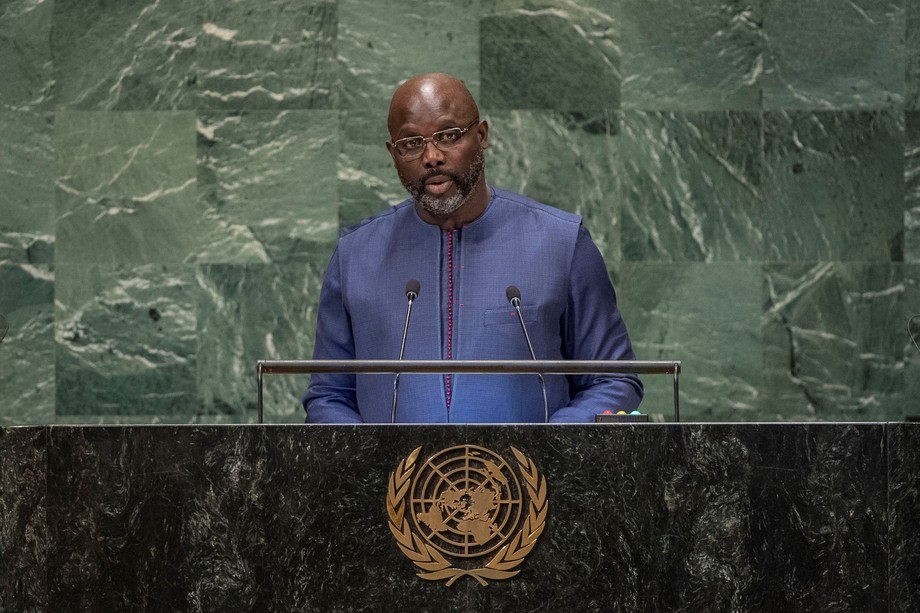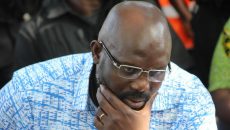President George Weah made his first address at the 73rd session of the U.N. General Assembly on September 26, 2018 in New York., where he laid out his government’s Pro-Poor Agenda to the world
It was a relatively uneventful speech and featured no noticeable gaffes, significant for a president who has often struggled with public speaking.
Weah thanked the United Nations for the role it played in securing and maintaining Liberia’s peace.
“My country has finally turned the corner, with more years of peace than preceding years of war, guided by our peace agreement signed in Accra 15 years ago,†he noted. “We thank the members and the Security Council of the United Nations for the UNMIL Peacekeeping Mission which brought stability and helped us rebuild our institutions and communities. We are a peacekeeping success story, and we are grateful for the support given.â€
Weah sought support for his Pro-Poor Agenda, which he outlined to the world leaders: “We want to build a harmonious society, based on the goal of economic empowerment, especially for the underprivileged. Our Pro-Poor Agenda is therefore designed to give power to the people, promote economic diversification, protect sustainable peace and encourage good governance.â€
He spoke on the need to provide quality education to the youth and the need to build vocational and entrepreneurial skills for youth too old to return to traditional school. Moreover, he noted his government’s need for funds and technical expertise in building roads and other infrastructure. The president also included information about the government’s goal of creating a special economic zone to promote light manufacturing and a goal of ensuring that the country was food secure and that the “health and wellbeing of our people is improved.â€
The president reiterated a promise about corruption that he often repeats but which has lost meaning due to his failure to act, “I also believe that the overwhelming mandate I received from the Liberian people is a mandate to end corruption in public service and I remain fully committed to this task.â€
It’s the same exact phrase he read to the Liberian people in a pre-recorded message on the missing billions as he was leaving the country, but Weah’s record on corruption is appalling. Despite strong calls from the public to do so, the president did not declare his assets until six months after he took office, in violation of the Code of Conduct. Moreover, Weah’s assets declaration was sealed and still has not been released to the public, even as reports emerge of him building several properties.
Under Weah’s leadership, two key anti-corruption agencies have also seen their budgets slashed. Alex Cuffy, the director general of the Financial Intelligence Unit, noted that the allotment for the FIU in the national budget was reduced from US$925,000 in 2017 to US$577,000 in 2018.
The executive chair of the Liberia Anti-Corruption Commission, James Verdier, also said his commission’s budget was reduced by US$300,000 from US$2,312,672 last fiscal year to US$2,008,362 in the current fiscal year. Verdier also pointed out that in the current budget, the commission has no allotment for litigation.
To the dismay of activists seeking to pressure the Liberian government into establishing a war crimes court, Weah made no promise to do such.
In fact, while he referenced the impact the war continues to have on individuals and that many still “bear the scars of conflict,†the president espoused a preference for “a series of national peace dialogues.â€
“It is clear to me that these frank exchanges are an essential step in bringing lasting healing, reconciliation, and unity to our people,†he said. “Our agenda is not one of division, but rather, it is an agenda that intends to provide an enabling environment for a united and reconciled people to be able to benefit and prosper from the economic dividends of peace.â€
Outside the U.N. headquarters, no more than two dozen protestors who were part of the March for Justice campaign pushed two agenda – the establishment of a war crimes court and for the government to account for the alleged missing billions of dollars in Liberian banknotes.
“We’re here today to petition the president of Liberia. The only way Liberia will fully heal again is justice,†said Christmas Sailey, in an interview with New Narratives’ Adrienne Tingba. He accused the president of protecting war criminals and appointing them into public office.
Professing to be a member of the ruling Coalition for Democratic Change party, he added, “People who know me from CDC will tell you about it. I never missed any CDC march… CDC wanted justice, CDC marched for justice. CDC protested for justice. What was right in 2004 is still right in 2018. What changed?â€
Unlike members of the twice as large group that showed up to welcome the president and thank him for what they saw as his achievements, Sailey said the March for Justice activists were not being paid to protest.
“We’re unpaid, but we’re courageous and we’re being driven by the conviction of justice for the innocent people who lost their lives. They’re Liberians too. Talking about development, the best development that President George Weah can accomplish is justice,†Sailey said. “The guns have been silent, but the war is not over yet. People are still hurt.â€
When asked by the reporter, Tingba, to address rumors of the government having paid people to welcome the president, Sammie Garblah, one of such who went to thank the president, sidestepped the question completely. He instead addressed the issue of the missing billions.
“Some of the people turned out today heard that the government is corrupt – they stole money,†Garblah said. “But I believe that the Liberian people have to be patient and you cannot just render judgment on a leader who just took office eight months 10 days and assume that he’s corrupt.â€
He added, “Let us be patient. Leadership is not about right away – leadership is about patience.â€
The welcome party for the president included Liberians from across the country who held signs that thanked Weah for initiatives such as the prioritization of roads, the proposal for the 14th Military Hospital, the payment of the US$1.9 million in WASSCE fees, and for ensuring that 2,000 medical workers were placed on the payroll.
The former representative of Montserrado’s 10th district, Julius Berrain, who lost his reelection bid in 2017, was also present to support the president.
“You will see no anti-demonstration here. We have overwhelmed and overwhelmingly taken over the place in support of this particular president as he delivers his thesis for the pro-poor government,†Berrain said.
He called the accusations of the missing billions “speculation†meant to detract from the work the president was doing.
Weah’s speech was well received by supporters back in Liberia, with many commenting on social media that he had hit the right notes.
Featured photo by Cia Pak/UN Photo



